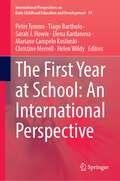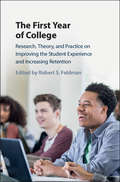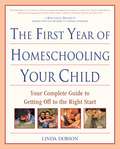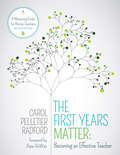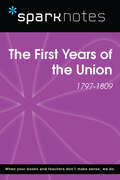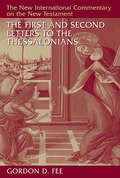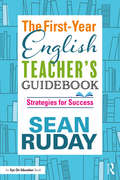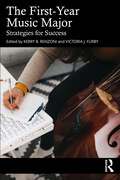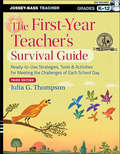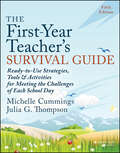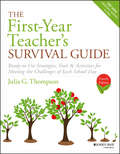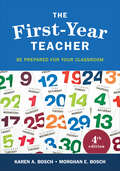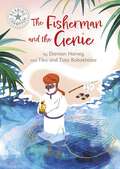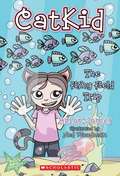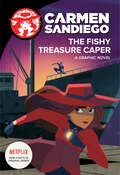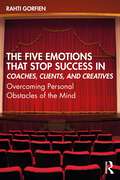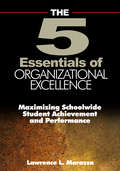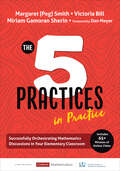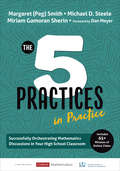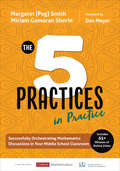- Table View
- List View
The First Year at School: An International Perspective (International Perspectives on Early Childhood Education and Development #39)
by Sarah J. Howie Peter Tymms Tiago Bartholo Elena Kardanova Mariane Campelo Koslinski Christine Merrell Helen WildyThis book explores an under-researched but vital part of education: the first year at primary/elementary school. The work shows that children’s progress varies enormously from school to school, class to class and child to child. This variation is important because the more progress that children make in that first year of school, the higher their academic attainment at the end of compulsory schooling. The iPIPS (international Performance Indicators in Primary Schools) project, upon which this book is based, has been able to provide deeper insights into some of the key issues within and across different contexts whilst highlighting new and some ongoing issues. Despite all the work there remain unanswered or new puzzling issues which are also explored. We need to know how to improve the education at that stage and, more broadly, we need greater clarity about when children should be taught to read and be introduced to formal arithmetic, in other words, when they should start school. We also need to be clearer about whether, when and how young children should be assessed. The book will suggest some answers but it will raise important questions and dilemmas for which we do not, as yet, have answers.
The First Year of College
by Robert S. FeldmanThe first year of college represents an enormous milestone in students' lives. Whether attending a four-year or two-year institution of higher education, living on campus or at home, or enrolled in a highly selective school or a college with an open-admissions policy, students are challenged in unique and demanding ways during their first year. Although many students rise to the challenges they face, for some the demands are too great. Retention rates beyond the first year are disappointing: one third of first-year students seriously consider leaving college during their first term, and ultimately one half of all students who start college complete it. What are the factors that impact students during their first year? How can the academic and social experiences of first-year students be optimized? What can we do to improve retention rates to maximize the number of students who complete college? Improving the First Year of College employs a variety of perspectives from leading researchers and student-service providers to address these questions and examine the first year of college. This volume also highlights the development of learning communities and coaching, as well as how technology impacts students' first year. Perhaps most important, the book provides examples of "best practices," as determined through research by leaders in the field, to permit educators to draw on their experiences.
The First Year of Homeschooling Your Child: Your Complete Guide to Getting Off to the Right Start (Prima Home Learning Library)
by Linda DobsonHomeschool the right way from day one. Are you considering homeschooling for your family? Today, many parents recognize that their child's school options are limited, inadequate, or even dangerous, and an increasing number are turning to homeschooling. But where do you start and how do you ensure the highest-quality educational experience, especially in that pivotal first year? This comprehensive guide will help you determine the appropriate first steps, build your own educational philosophy, and discover the best ways to cater to your child's specific learning style, including: ·When, why, and how to get started ·The best ways to develop an effective curriculum, assess your child's progress, and navigate local regulations ·Kid-tested and parent-approved learning activities for all age levels ·Simple strategies for developing an independent child and strengthening family and social relationships ·And much, much more! "To the thousands of requests we receive for help from families new to homeschooling, we will now recommend this warm and knowledgeable book. It will ensure that all families make it to the second year-including yours!" -Elizabeth Kanna, editor in chief, Homeschool. com "Linda Dobson addresses all the issues facing parents as they consider the task of homeschooling over other educational options. Those who wonder whether they really can or want to do the job will find unique perspectives in this well-researched work. "-Beverly K. Eakman, author and cofounder, National Education Consortium
The First Years Matter: A Mentoring Guide for Novice Teachers (Corwin Teaching Essentials)
by Carol Pelletier RadfordUse this updated resource to prepare for your journey into teaching This newly revised and updated 2nd edition of The First Years Matter provides key actions steps and a flexible twelve-month curriculum - including July for reflection and planning - to help you proactively prepare for your first few years in the classroom. Maximize your effectiveness in the classroom as you: Apply mentoring lessons to differentiate instruction Integrate student voice Prepare for teacher observations and standardized testing Gather evidence to document your progress This updated version includes a robust companion website featuring videos, downloadable forms, and a journal for reflection. Use with Mentoring in Action, the companion guide for mentors!
The First Years Matter: A Mentoring Guide for Novice Teachers (Corwin Teaching Essentials)
by Carol Pelletier RadfordUse this updated resource to prepare for your journey into teaching This newly revised and updated 2nd edition of The First Years Matter provides key actions steps and a flexible twelve-month curriculum - including July for reflection and planning - to help you proactively prepare for your first few years in the classroom. Maximize your effectiveness in the classroom as you: Apply mentoring lessons to differentiate instruction Integrate student voice Prepare for teacher observations and standardized testing Gather evidence to document your progress This updated version includes a robust companion website featuring videos, downloadable forms, and a journal for reflection. Use with Mentoring in Action, the companion guide for mentors!
The First Years of the Union (SparkNotes History Notes)
by SparkNotesThe First Years of the Union (1797-1809) (SparkNotes History Note) Making the reading experience fun! SparkNotes History Guides help students strengthen their grasp of history by focusing on individual eras or episodes in U.S. or world history. Breaking history up into digestible lessons, the History Guides make it easier for students to see how events, figures, movements, and trends interrelate. SparkNotes History Guides are perfect for high school and college history classes, for students studying for History AP Test or SAT Subject Tests, and simply as general reference tools.Each note contains a general overview of historical context, a concise summary of events, lists of key people and terms, in-depth summary and analysis with timelines, study questions and suggested essay topics, and a 50-question review quiz.
The First and Second Book of Esdras: Edited (classic Reprint)
by Archibald DuffBefore providing helpful notes and English translations of the first and second books of Esdras, Archibald Duff gives an in-depth introduction to the books. This introduction covers the books’ origin, authorship, and intended audience. Dedicated sections explain each book’s doctrine, and Duff lays out “The Christian’s Need for Esdras 1 and 2.”-Print ed.
The First and Second Letters to the Thessalonians (The New International Commentary on the New Testament)
by Gordon D. FeeIn this commentary Gordon Fee aims first and foremost to offer a fresh exposition of the text of 1 and 2 Thessalonians. He shows the reader what is in the biblical text, what the text meant in the first century, and what it means now. Fee reveals the logic of each argument or narrative before moving on to the details of each verse, and he concludes each section with a theological-practical reflection on the meaning of the text today. Among other things, Fee explores the occasion for writing for each epistle, restoring 2 Thessalonians to the place it deserves as a full companion to the first letter, rather than merely a tagalong to 1 Thessalonians.
The First-Year English Teacher's Guidebook: Strategies for Success
by Sean RudayThe First-Year English Teacher’s Guidebook offers practical advice and recommendations to help new English teachers thrive in the classroom. Each chapter introduces a concept crucial to a successful first year of teaching English and discusses how to incorporate that concept into your daily classroom practice. You’ll find out how to: Clearly communicate instructional goals with students, parents, and colleagues; Incorporate students' out-of-school interests into the curriculum; Use assignment-specific rubrics to respond to student writing in meaningful ways; Integrate technology into ELA instruction; Conduct student-centered writing conferences; Make time for self-care and self-improvement; and much, much more. Additionally, the guidebook provides a number of forms, templates, graphic organizers, and writing prompts that will enable you to put the author’s advice into immediate action. These tools are available for download on the book’s product page: www.routledge.com/9781138495708.
The First-Year Music Major: Strategies for Success
by Victoria J. FurbyDesigned to address the many challenges that first-year undergraduate music students often encounter, The First-Year Music Major: Strategies for Success provides concrete approaches that will help anyone embarking on a degree in music develop the knowledge and skills needed to complete their first year successfully. The chapters demystify the path of majoring in music, and address key topics including: Planning a road map for the degree Developing needed musical, academic, professional, practice, and performance skills Building financial, mental, and physical well-being strategies Written by a group of experienced professors and advisors in roles across the faculty of music, this book offers a comprehensive resource for first-year music students that will help them develop foundational skills to pursue music degrees and careers. An online e-resource accompanies the book, providing downloadable worksheets and materials referenced in the chapters. Rooted in research and extensive practical experience, The First-Year Music Major is suited to use both in introductory music courses and by individual students and advisors.
The First-Year Music Major: Strategies for Success
by Victoria J. FurbyDesigned to address the many challenges that first-year undergraduate music students often encounter, The First-Year Music Major: Strategies for Success provides concrete approaches that will help anyone embarking on a degree in music develop the knowledge and skills needed to complete their first year successfully. The chapters demystify the path of majoring in music, and address key topics including: Planning a road map for the degree Developing needed musical, academic, professional, practice, and performance skills Building financial, mental, and physical well-being strategies Written by a group of experienced professors and advisors in roles across the faculty of music, this book offers a comprehensive resource for first-year music students that will help them develop foundational skills to pursue music degrees and careers. An online e-resource accompanies the book, providing downloadable worksheets and materials referenced in the chapters. Rooted in research and extensive practical experience, The First-Year Music Major is suited to use both in introductory music courses and by individual students and advisors.
The First-Year Teacher's Survival Guide
by Julia G. ThompsonThoroughly revised edition of the bestselling resource for new teachersThis award-winning book gives beginning educators everything they need to survive and thrive in the classroom. The third edition covers new material including working as a part of a professional learning community (PLC), teaching media literacy and social responsibility, incorporating Common Core State Standards, handling "homework push-back" from parents, changes in classroom technology, techniques for motivating students, seeking feedback, and much more.A fully revised edition of a trusted resource, offering solutions to challenges and typical scenarios encountered by new teachers Bonus CD features downloadable versions of the book's checklists, forms, worksheets, and self-assessmentsIncludes Discussion Questions and a handy training guide for Professional Development providersThis popular resource offers teachers an essential guide for knowing what to expect when they begin their career and ideas for solving classroom problems.
The First-Year Teacher's Survival Guide: Ready-to-Use Strategies, Tools & Activities for Meeting the Challenges of Each School Day (J-b Ed: Survival Guides)
by Julia G. Thompson Michelle CummingsThe quick, comprehensive, and accessible guide that new educators need to make it through the first year and thrive in the profession. The First-Year Teacher's Survival Guide provides valuable strategies, activities, and tools you need to succeed in the classroom. Now in its fifth edition, this book meets the needs of today’s K-12 teachers, updated with the latest tools, techniques, and topics that aren’t addressed in teacher education programs. Inside, you will find practical information on classroom management, professional growth, trauma-informed practices, student engagement, social-emotional learning and more. You’ll also get an essential introduction to teaching and learning in an AI-enabled world, as well as maximizing the use of digital tools, devices, and apps. With downloadable forms, templates, and additional resources available online, this book truly supports you as you enter the challenging and rewarding profession of education. Get ideas for communicating with concerned parents and caregivers Learn tips for maintaining a comfortable work-life balance and prioritizing self-care Help your students succeed with tech-integration and personalized instruction Maintain a calm, safe classroom with classroom management techniques, apps, and restorative practices Discover proven strategies for creating a positive classroom environment and, supportive relationships with students This must-have guide is filled with the information and tips new K-12 teachers need to face classroom challenges with confidence and thrive in the profession.
The First-Year Teacher's Survival Guide: Ready-to-use Strategies, Tools And Activities For Meeting The Challenges Of Each School Day (J-b Ed: Survival Guides)
by Julia G. ThompsonThoroughly revised edition of the bestselling resource for new teachers--complete with discussion questions, downloadable handouts, and a staff development guide <p><p> This award-winning book gives beginning educators everything they need to survive and thrive in the classroom. The fourth edition covers new and updated material on: classroom management--including how to prevent or minimize disruptions, differentiated instruction, nurturing a growth mindset, how to develop and maintain positive relationships with students, and much more. <p> A revised edition of a trusted resource, offering solutions to challenges and typical scenarios encountered by new teachers <p> Downloadable versions of the book's checklists, forms, worksheets, and self-assessments are available online <p> Includes Discussion Questions and a handy training guide for Professional Development providers <p> This popular resource offers teachers an essential guide for knowing what to expect when they begin their career and ideas for solving classroom problems.
The First-Year Teacher: Be Prepared for Your Classroom
by Karen A. Bosch Morghan E. BoschThe survival guide for new teachers—now updated! Thousands of new teachers have relied on this practical resource, both early in their careers and during later transitions. Now in its fourth edition, this best-selling title is newly updated with chapters addressing classroom management, special education, inclusive classrooms and more. The First Year Teacher will help you Complete a successful job search and prepare for your new position Start the year strong with a 30-day learning plan that addresses instruction, assessment, and classroom management Co-teach in an inclusive classroom— particularly valuable for special education teachers Build essential skills in planning, managing time, and partnering with families
The Fisherman and the Genie: Independent Reading White 10 (Reading Champion #1077)
by Damian HarveyThis story is part of Reading Champion, a series carefully linked to book bands to encourage independent reading skills, developed with Dr Sue Bodman and Glen Franklin of UCL Institute of Education (IOE)The Fisherman and the Genie is an Arabic tale in a which a poor fisherman must outwit a terrifying genie to stay alive.Reading Champion offers independent reading books for children to practise and reinforce their developing reading skills.Fantastic, original stories are accompanied by engaging artwork and a reading activity. Each book has been carefully graded so that it can be matched to a child's reading ability, encouraging reading for pleasure. Perfect for 5-7 year olds or those reading book band white 10.
The Fishy Field Trip (CatKid)
by Brian JamesWhen CatKid finds out her class is going on a trip to the aquarium, she is psyched. But she's totally disappointed to discover you don't eat the fish -- you just look at them! Once she arrives, she's amazed at all there is to see -- tropical fish, jellyfish, and sea horses, too. The class is given a treasure hunt to complete during the trip, so she and her best friend, Maddie, team up to prove that no one has a nose for fish quite like CatKid.
The Fishy Treasure Caper (Carmen Sandiego Graphic Novels)
by Clarion BooksThis full-color graphic novel, based on the Netflix series starring Gina Rodriguez, introduces kids to geography, culture, and history! Learn about all about Ecuador in this fun, new format! Where in the world is Carmen Sandiego? Headed to the South American country of Ecuador for her next caper! It's up to Carmen and her crew to stop VILE from their evil exploits in the waters just off the coast—but what is VILE after this time? Adventure awaits in this action-packed graphic novel starring the world's greatest thief.
The Five Emotions That Stop Success in Coaches, Clients, and Creatives: Overcoming Personal Obstacles of the Mind
by Rahti GorfienThis book uniquely identifies the five key emotions that prevent clients reaching their full creative potential and provides coaches tools to help them overcome them, boosting their productivity as well as their ability to complete and promote their work and personal development. Accessible and personable, Rahti Gorfien interweaves stories from her personal life and private practice to alleviate the burden of blockages creatives generated by their own divergent thinking, unconscious conditioning, and memory. She takes each mindset in turn, shame, grandiosity, envy, boredom, and fear, and explores each emotion and how coaches can practically help clients overcome them to achieve creative freedom and success personally and professionally. Filled with practical exercises and coaching theory throughout, this book will equip coaches with tools to inspire confidence in their clients to share their work with the world, silencing negative inner voices and fulfilling their professional creative goals. This book is invaluable reading for coaches as well as artists, entrepreneurs, therapists, career advisors, social workers and those interested in finding methods of overcoming personal obstacles to making meaningful and authentic contributions through the freedom of their singular and passionate pursuits.
The Five Essentials of Organizational Excellence: Maximizing Schoolwide Student Achievement and Performance
by Dr Lawrence L. MarazzaThe essential strategies presented in this resource explore the necessity for building strong relationships among and between administrators, teachers, parents, and the community.
The Five Practices in Practice [Elementary]: Successfully Orchestrating Mathematics Discussions in Your Elementary Classroom (Corwin Mathematics Series)
by Margaret (Peg) Smith Miriam Gamoran Sherin Victoria L. Bill"Neither a love of students nor a love of mathematics can sustain the work of math education on its own. We work with math students, a composite of their mathematical ideas and their identities as people. The five practices for orchestrating productive mathematical discussions, and these ideas for putting those practices into practice, offer the actions that can develop and sustain the belief that both math and students matter." From the Foreword by Dan Meyer, Chief Academic Officer, Desmos Take a deeper dive into understanding the five practices—anticipating, monitoring, selecting, sequencing, and connecting—for facilitating productive mathematical conversations in your elementary classrooms and learn to apply them with confidence. This follow-up to the modern classic, Five Practices for Orchestrating Productive Mathematics Discussions, shows the five practices in action in Grades K-5 classrooms and empowers teachers to be prepared for and overcome the challenges common to orchestrating math discussions. The chapters unpack the five practices and guide teachers to a deeper understanding of how to use each practice effectively in an inquiry-oriented classroom. This book will help you launch meaningful mathematical discussion through • Key questions to set learning goals, identify high-level tasks, anticipate student responses, and develop targeted assessing and advancing questions that jumpstart productive discussion—before class begins • Video excerpts from real elementary classrooms that vividly illustrate the five practices in action and include built-in opportunities for you to consider effective ways to monitor students’ ideas, and successful approaches for selecting, sequencing, and connecting students’ ideas during instruction • "Pause and Consider" prompts that help you reflect on an issue—and, in some cases, draw on your own classroom experience—prior to reading more about it • "Linking To Your Own Instruction" sections help you implement the five practices with confidence in your own instruction The book and companion website provide an array of resources including planning templates, sample lesson plans and completed monitoring tools, and mathematical tasks. Enhance your fluency in the five practices to bring powerful discussions of mathematical concepts to life in your classroom.
The Five Practices in Practice [Elementary]: Successfully Orchestrating Mathematics Discussions in Your Elementary Classroom (Corwin Mathematics Series)
by Margaret (Peg) Smith Miriam Gamoran Sherin Victoria L. Bill"Neither a love of students nor a love of mathematics can sustain the work of math education on its own. We work with math students, a composite of their mathematical ideas and their identities as people. The five practices for orchestrating productive mathematical discussions, and these ideas for putting those practices into practice, offer the actions that can develop and sustain the belief that both math and students matter." From the Foreword by Dan Meyer, Chief Academic Officer, Desmos Take a deeper dive into understanding the five practices—anticipating, monitoring, selecting, sequencing, and connecting—for facilitating productive mathematical conversations in your elementary classrooms and learn to apply them with confidence. This follow-up to the modern classic, Five Practices for Orchestrating Productive Mathematics Discussions, shows the five practices in action in Grades K-5 classrooms and empowers teachers to be prepared for and overcome the challenges common to orchestrating math discussions. The chapters unpack the five practices and guide teachers to a deeper understanding of how to use each practice effectively in an inquiry-oriented classroom. This book will help you launch meaningful mathematical discussion through • Key questions to set learning goals, identify high-level tasks, anticipate student responses, and develop targeted assessing and advancing questions that jumpstart productive discussion—before class begins • Video excerpts from real elementary classrooms that vividly illustrate the five practices in action and include built-in opportunities for you to consider effective ways to monitor students’ ideas, and successful approaches for selecting, sequencing, and connecting students’ ideas during instruction • "Pause and Consider" prompts that help you reflect on an issue—and, in some cases, draw on your own classroom experience—prior to reading more about it • "Linking To Your Own Instruction" sections help you implement the five practices with confidence in your own instruction The book and companion website provide an array of resources including planning templates, sample lesson plans and completed monitoring tools, and mathematical tasks. Enhance your fluency in the five practices to bring powerful discussions of mathematical concepts to life in your classroom.
The Five Practices in Practice [High School]: Successfully Orchestrating Mathematics Discussions in Your High School Classroom (Corwin Mathematics Series)
by Margaret (Peg) Smith Miriam Gamoran Sherin Michael D. Steele"This book makes the five practices accessible for high school mathematics teachers. Teachers will see themselves and their classrooms throughout the book. High school mathematics departments and teams can use this book as a framework for engaging professional collaboration. I am particularly excited that this book situates the five practices as ambitious and equitable practices." Robert Q. Berry, III NCTM President 2018-2020 Samuel Braley Gray Professor of Mathematics Education, University of Virginia Take a deeper dive into understanding the five practices—anticipating, monitoring, selecting, sequencing, and connecting—for facilitating productive mathematical conversations in your high school classrooms and learn to apply them with confidence. This follow-up to the modern classic, 5 Practices for Orchestrating Productive Mathematics Discussions, shows the five practices in action in high school classrooms and empowers teachers to be prepared for and overcome the challenges common to orchestrating math discussions. The chapters unpack the five practices and guide teachers to a deeper understanding of how to use each practice effectively in an inquiry-oriented classroom. This book will help you launch meaningful mathematical discussion through · Key questions to set learning goals, identify high-level tasks, anticipate student responses, and develop targeted assessing and advancing questions that jumpstart productive discussion—before class begins · Video excerpts from real high school classrooms that vividly illustrate the five practices in action and include built-in opportunities for you to consider effective ways to monitor students’ ideas, and successful approaches for selecting, sequencing, and connecting students’ ideas during instruction · "Pause and Consider" prompts that help you reflect on an issue—and, in some cases, draw on your own classroom experience—prior to reading more about it · "Linking To Your Own Instruction" sections help you implement the five practices with confidence in your own instruction The book and companion website provide an array of resources including planning templates, sample lesson plans, completed monitoring tools, and mathematical tasks. Enhance your fluency in the five practices to bring powerful discussions of mathematical concepts to life in your classroom.
The Five Practices in Practice [High School]: Successfully Orchestrating Mathematics Discussions in Your High School Classroom (Corwin Mathematics Series)
by Margaret (Peg) Smith Miriam Gamoran Sherin Michael D. Steele"This book makes the five practices accessible for high school mathematics teachers. Teachers will see themselves and their classrooms throughout the book. High school mathematics departments and teams can use this book as a framework for engaging professional collaboration. I am particularly excited that this book situates the five practices as ambitious and equitable practices." Robert Q. Berry, III NCTM President 2018-2020 Samuel Braley Gray Professor of Mathematics Education, University of Virginia Take a deeper dive into understanding the five practices—anticipating, monitoring, selecting, sequencing, and connecting—for facilitating productive mathematical conversations in your high school classrooms and learn to apply them with confidence. This follow-up to the modern classic, 5 Practices for Orchestrating Productive Mathematics Discussions, shows the five practices in action in high school classrooms and empowers teachers to be prepared for and overcome the challenges common to orchestrating math discussions. The chapters unpack the five practices and guide teachers to a deeper understanding of how to use each practice effectively in an inquiry-oriented classroom. This book will help you launch meaningful mathematical discussion through · Key questions to set learning goals, identify high-level tasks, anticipate student responses, and develop targeted assessing and advancing questions that jumpstart productive discussion—before class begins · Video excerpts from real high school classrooms that vividly illustrate the five practices in action and include built-in opportunities for you to consider effective ways to monitor students’ ideas, and successful approaches for selecting, sequencing, and connecting students’ ideas during instruction · "Pause and Consider" prompts that help you reflect on an issue—and, in some cases, draw on your own classroom experience—prior to reading more about it · "Linking To Your Own Instruction" sections help you implement the five practices with confidence in your own instruction The book and companion website provide an array of resources including planning templates, sample lesson plans, completed monitoring tools, and mathematical tasks. Enhance your fluency in the five practices to bring powerful discussions of mathematical concepts to life in your classroom.
The Five Practices in Practice [Middle School]: Successfully Orchestrating Mathematics Discussions in Your Middle School Classroom (Corwin Mathematics Series)
by Margaret (Peg) Smith Miriam Gamoran SherinTake a deep dive into the five practices for facilitating productive mathematical discussions Take a deeper dive into understanding the five practices—anticipating, monitoring, selecting, sequencing, and connecting—for facilitating productive mathematical conversations in your middle school classrooms and learn to apply them with confidence. This follow-up to the modern classic, Five Practices for Orchestrating Productive Mathematics Discussions, shows the five practices in action in middle school classrooms and empowers teachers to be prepared for and overcome the challenges common to orchestrating math discussions. The chapters unpack the five practices and guide teachers to a deeper understanding of how to use each practice effectively in an inquiry-oriented classroom. This book will help you launch meaningful mathematical discussion through Key questions to set learning goals, identify high-level tasks, anticipate student responses, and develop targeted assessing and advancing questions that jumpstart productive discussion—before class begins Video excerpts from real middle school classrooms that vividly illustrate the five practices in action and include built-in opportunities for you to consider effective ways to monitor students’ ideas, and successful approaches for selecting, sequencing, and connecting students’ ideas during instruction "Pause and Consider" prompts that help you reflect on an issue—and, in some cases, draw on your own classroom experience—prior to reading more about it "Linking To Your Own Instruction" sections help you implement the five practices with confidence in your own instruction The book and companion website provide an array of resources including planning templates, sample lesson plans and completed monitoring tools, and mathematical tasks. Enhance your fluency in the five practices to bring powerful discussions of mathematical concepts to life in your classroom. "This books takes 5 Practices for Orchestrating Productive Mathematics Discussions to the next level as readers experience what these practices look like in real mathematics classrooms in middle school. The authors specifically address the challenges one might face in implementing the classrooms by providing recommendations and concrete examples to avoid these challenges. This book is a must read for teachers who want to amplify their classroom implementation of the five practices." Cathy Martin, Executive Director of Curriculum & Instruction Denver Public Schools
